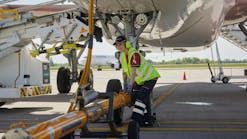The suspected terrorist plot foiled by British investigators underscores the continued need for a federal insurance program for airlines developed in response to the Sept. 11 attacks, according to an aviation consultant at one of the nation's largest insurance brokerages.
Without the coverage provided by the war-risk insurance program, which is set to expire Aug. 31, a catastrophic loss of lives and aircraft due to a terrorist attack "would crater the commercial insurance market," said Wayne Wignes, president of the aviation group for Chicago-based insurance broker Aon.
The Air Transport Association, an industry trade group, has called the program "indispensable" for the nation's carriers.
Commercial liability coverage generally does not cover carriers for most of the losses caused by acts of war. And going without coverage is not an option. The banks and financiers that have pumped billions of dollars into the aviation industry demand carriers have war-risk insurance, as do many foreign countries, .
"You need it to respond to a 9/11-type event, for the loss of the airplane, the loss of passengers and any third-party claims," Wignes said.
In addition to offering affordable coverage, the government program brings a necessary sense of stability, said Tim Bonnell Sr., president of PIM Aviation Insurance, a Kansas-based broker.
"There's not the fear that if we had another incident, that the coverage will be canceled," Bonnell said. "The commercial market can issue a seven-day notice that they're getting out of the war-risk. Or they can come back and say if you want to keep your coverage, it's going to cost so much amount more, and we're going to exclude these territories."
The government contracts with carriers such as United Airlines and ATA Airlines for charter flights into Kuwait and other areas. Without the federal insurance program, it could be difficult for some carriers to obtain coverage that would be valid in those areas, Bonnell said.
The cost of devastation caused by terrorists is difficult to forecast, but the monetary toll could quickly reach into the billions of dollars. The suspected bombers arrested this week reportedly had targeted 10 wide-body jets.
The list price on just the aircraft begins at more than $200 million each. The costs associated with loss of human life could be higher. In the aftermath of the Sept. 11 attacks five years ago, Congress created a federal fund to compensate victims' families and shield the airline industry and insurers from potentially crippling lawsuits.
In exchange for agreeing to forgo litigation, families could receive payment from the fund. Some still went forward with lawsuits seeking millions of dollars in damages.
The war-risk insurance program allows U.S.-based carriers to buy insurance from the government. Commercially available insurance costs skyrocketed, and policy terms became more restrictive following 9/11.
The program will expire at the end of the month but can be extended until the end of the year at the discretion of Maria Cino, acting U.S. secretary of transportation. Another extension can be made through 2007, a transportation spokesman said.
"It's going to take Congress to extend it beyond next year," Wignes said.
During the past five years, the federal government has collected about $100 million in premiums but has not had to spend any money.
"They've never had a payout under this program because this program was introduced after 9/11," Wignes said. "But that also reinforces something: $100 million doesn't do much if there is a terrorist attack, because it's beyond the financial capacity of traditional insurers."
Carriers are behind the renewal effort, as are insurance companies. The only opposition has come from foreign carriers that do not enjoy a similar insurance program in their countries, Wignes said.
"They argue it's a subsidy," he said.
The issue has been raised in talks that U.S. aviation officials have had with some countries about increasing access for carriers, Wignes said.
Bonnell said the insurance industry has supported the government program because no carrier can afford the risk associated with a terrorist attack.
"We've had a pretty good run the past five years, and maybe some people were starting to think, 'Do we really still need this,'" he said. "We'll just look at the events yesterday."
Copyright 2005 LexisNexis, a division of Reed Elsevier Inc. All rights reserved.
Terms and Conditions | Privacy Policy
News stories provided by third parties are not edited by "Site Publication" staff. For suggestions and comments, please click the Contact link at the bottom of this page.





